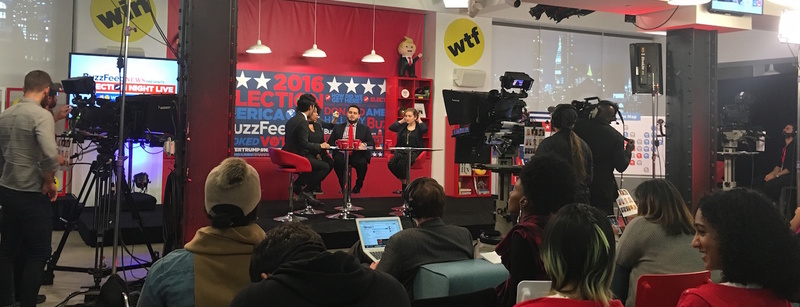Sign up for The Media Today, CJR’s daily newsletter.
The “Nasty Woman” cocktail was really just a cosmo on the rocks, a traditional offering dressed up in a topical joke. Along with the “Bad Hombre”—a spicy cilantro margarita—it seemed to at first provide a bit of grease to the celebratory wheels of BuzzFeed’s entertainment-side staffers as they took their seats to watch the company stream a live, election-night special via Twitter from its Manhattan office on Tuesday.
Hubris was also on the menu. The event was an ambitious attempt to combine BuzzFeed’s modernist style with a traditional format and, in turn, connect advertisers with a target-rich audience of youthful elites. But what was supposed to be the coronation of America’s first female president turned into something completely different, leaving the stylish millennials in the live crowd increasingly turning to their drinks for liquid courage.
“We’re doing this our own way,” host Eugene Lee Yang said soon after the program’s 6 p.m. start time. His promise belied the effort’s conventional setup: five people sitting at a round table. But it proved true in regard to BuzzFeed’s bundle of political analysis and reports from the field alongside celebrity interviews and periodic segments on “fire tweets”—that is, zingers on Twitter. The BuzzFeed entertainment staffers in the live audience, largely separated from the BuzzFeed News journalists pumping out stories a few rooms over, initially howled at each mention of another “WTF campaign moment.”
Every news startup is a media critique in its own right. Tuesday’s program was BuzzFeed’s take on cable news’ election-night specials, long on internet memes and short on the analytical minutiae that drives so much live political coverage. There was little of the usual real-time punditry about narratives forming or dissipating. There was no white man in a suit making blue and red electoral magic on a giant touchscreen monitor. And there were occasional moments designed to make fun of cable, including a brief supercut of CNN’s Wolf Blitzer announcing “Key Race Alerts.”
Guests of Buzzfeed’s election event could order a “Nasty Woman” cocktail or a “Bad Hombre” spicy margarita. Photo by David Uberti
“We don’t pretend we have special wizards in the back room,” Editor in Chief Ben Smith, in a blue blazer, told me while we stood next to a makeshift control room for the night. “We’re not trying to create a false sense that we know everything. We’re trying to approach this not with fake authority and theatrics, but with transparency.”
Smith shuffled back and forth between his newsroom and the specially built studio in BuzzFeed’s cafeteria for much of the night, eyes often glued to his phone. “Like any reporter, I have a lot of nervous energy,” he said. “There’s just so much downtime before results start coming in, so in some ways it’s great to have this huge production….The thing with election night is that there’s a lot of fucking news.”
Related: Journalism’s moment of reckoning has arrived
And on this election night, a lot of bad news for the BuzzFeed entertainment staffers arrayed in a room adorned with huge “WIN” and “WTF” stickers. The live show provided a useful diversion for a few hours before establishment players began dissecting results in earnest. BuzzFeed’s plan was to call states less aggressively, leaving the artisanally minded crowd arrayed before it frantically scrolling through updates on their phones to get John King’s latest analysis of Cuyahoga County turnout.
There’s never been anything quite like Donald Trump. There will be an immediate global crisis if he’s elected.
BuzzFeed News was prepared to cover a Hillary Clinton administration adversarially, Smith told me around 7 p.m. “There’s never been anything quite like Donald Trump,” he added. “There will be an immediate global crisis if he’s elected.”
Smith’s journalists did appear poised to report on that crisis as they periodically beamed in with live reports from candidates’ watch parties or other locations. The same couldn’t be said for the crowd of BuzzFeed internet-makers sitting in front of the live show’s stage. The collective mood grew increasingly dour as push notifications alerting them to each successive Trump victory began popping up on their phones.
But these onlookers also needed to play the dual role of studio audience. At one point between segments, a staffer asked them to keep cheering for additional segments and interviews. “I know things aren’t going great right now,” he said. “But there a lot more people watching than the people in this room.” (Final audience numbers are not yet available.) As strong results for Trump continued to trickle in, a few hands from the news side could be heard grumbling about the lack of ideological diversity in the crowd—and, eventually, tongue-in-cheek relief that the event hadn’t turned into an informal Clinton victory party, as some had feared.
The apprehension became palpable as The New York Times’ real-time projection meters ticked further in Trump’s direction. A BuzzFeed spokeswoman eventually asked me to leave around 10:30 p.m., long before the decisive states were called. She didn’t give me a firm reason why, but I could hazard a guess. It was a rude awakening–streamed live online–for a digital media giant coming into its own.
Has America ever needed a media defender more than now? Help us by joining CJR today.



